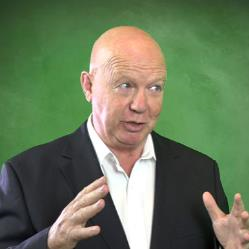 "Large enterprises want less suppliers - are you in danger?" - Interview by John Smibert
"Large enterprises want less suppliers - are you in danger?" - Interview by John Smibert
Author Graham Hawkins recently stated that most technology providers will never sell to large enterprises again. So in this discussion I challenged him to explain himself.
 He said that the cost of managing a large number of vendors is costly and takes too much management focus. So they are deciding to reduce the number of suppliers.
He said that the cost of managing a large number of vendors is costly and takes too much management focus. So they are deciding to reduce the number of suppliers.
This creates a threat to many technology providers. Their most lucrative market doesn't want to buy from them any more - and if you are an existing supplier you are at risk of being culled.
But the news is not all bad. Graham tells us that there is something you can do to address this risk - but if you don't take action it will most likely damage your business.
View or read the interview to better understand the issue you face and learn what you need to do about it.
************
Graham Hawkins is a thought leader in B2B technology sales and an author. He has recently published his book "Sales Transformation"
Interview
John: I'm delighted to have with me Graham Hawkins - Graham, welcome!
Graham: Thanks, John - nice to be here!
John: Graham is a thought leader in the world of large, B2B complex business, particularly in the technology arena, and I want to really raise some questions on some statements I've heard you made recently.
Graham: Okay.
John: Graham, you've made a statement that most technology providers will never sell to large corporates again. Did I hear you right?
Graham: You did, John; it's a controversial statement, but let me clarify what I'm talking about. There's increasing pressure on technology buyers now to do more business with less vendors, and a recent experience of mine with a large airline demonstrated to me that selling direct to end users now is increasingly difficult for salespeople.
John: What was that experience?
Graham: The experience was - and it's the first time I'd heard this term "vendor stack" - in this particular airline I was dealing with the head of procurement and vendor management, and that woman explained to me that, my company was in tier three, so they break their vendor stack into three tiers, and she explained to me that my company was at risk of being culled from the vendor stack. I said of course, "What does that mean?"
John: [laughs] Ouch!
Graham: Yes, a little bit concerning! So, I said, "What does that mean? Explain that to me," and she said, "We have 363 vendors in tier three..."
John: [laughs] That'll take some managing!
Graham: A lot of managing and a lot of cost, and the problem with that is that she said, "I'm being tasked now with taking the 363 back to 100." I said of course, "What does that mean for my company and my go-to-market model?" and she said, "It means you'll either be culled, or you will be asked now to procure or sell your products to us by one of our tier one partners or prime partners."
John: Oh, okay. So you're not saying that we can't sell to these large corporates, you're saying we might have to go through another channel to get our product in there but we won't actually get them to sign an order.
Graham: Yes, correct. Customers need to do more business with less vendors, they're all saying that now and they're all acting on that. Another example, I spoke with a large banking and finance customer recently who explained that they actively block off panel purchases, meaning if you're a new vendor that's coming to them trying to sell them something new, they will block you and either say, "No, find a substitute product from someone else..."
John: But what if I've got the world's best product, the radical new product that's going to really dramatically reduce their costs, reduce their risk or whatever?
Graham: Yes, that's a good point. You'll still get a seat at the table, but you might be asked to go via one of their tier ones.
John: Are you saying I still should be talking to that large corporate? You're not saying, "Don't talk to the large corporate."
Graham: No, I'm not saying that; what I am saying is that it's increasingly difficult to get direct relationships with large corporates, particularly in the technology sector - that's my background - because the pressure is on to reduce the number of vendors they're dealing with.
John: So if they've got somebody that manages all the services, manages a lot of the technology that they're currently using, that's who we should be talking to?
Graham: In some cases, yes. Now, that's... It's a changing world, this is transitioning from what I grew up with, selling direct to selling via a channel partner or a tier one or prime vendor.
John: So, let me summarise. From my understanding, from what you're saying, this is pretty radical, because basically we're saying, "Hey, we've got to think differently. If I'm a technology provider and I want to sell to a large corporates, I may not even get to open a door into those corporates, but even if I do they're not going to buy from me. I'm going to have to look at other channels to get my product through into that large corporate."
Graham: Yes. The real risk for salespeople now, John, is they spend a lot of time trying to break open these new accounts; they go through a sales cycle, only to find at the end that they're being blocked through dealing direct. So salespeople now have to understand the customer's vendor stack and where they sit on it. They have to understand things like does the customer has a policy for blocking new vendors, what is an exemplary experience a customer's had with a vendor - it's that kind of thing.
John: Right, okay. So really we need to spend our time selling to other technology providers or technology managers that manage service providers and so on, rather than the end customer.
Graham: Certainly salespeople must start to align themselves with other key vendors within the target account - that's critical.
John: Okay. So, all salespeople and sales leaders out there, where do you fit in the vendor stack?
Graham: Correct.
John: And if you're not in the top few, you've got to think differently about the way you sell.
Graham: Exactly.
John: Thank you very much, Graham - look forward to having more discussions!
Graham: Thanks, John - great to be here, thank you!
****************

Your Invitation: I invite you to join the Sales Leader Forum group on LinkedIn where you can experience informative discussions with your peers and sales thought leaders on subjects like the one we have discussed here. I also invite you to subscribe to the
- Sales Leader Resource Centre here
- Sales Leader YouTube channel here (300+ sales leadership videos)
Please Share: If you valued this article, please share via your Twitter, LinkedIn, Google+ and Facebook social media platforms. I encourage you to join the conversation or ask questions. So feel free to add a comment on this post - I promise to respond. If inclined please follow my LinkedIn post page here.
Want to touch base? If you have questions please feel free to contact me - email: john.smibert(at)salesleaderforums.com, Phone: +61 404857893 or Skype: john.smibert